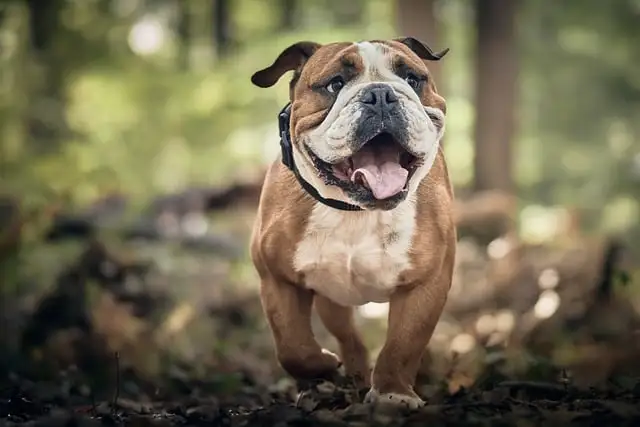By understanding why is my dog breathing fast, dog guardians can offer appropriate first aid response.
Has your dog breathing been quicker than normal lately? You may have noticed their chest rising and falling at a rapid pace.
While fast breathing can be caused by normal activity and playing, it’s important to identify possible underlying issues that could signal health problems.
This article will explore the most common causes of accelerated respiration in canines, from overheating and stress to more serious conditions like heart disease or respiratory infections.
We’ll provide tips for evaluating breathing rate changes and knowing when to seek veterinary help.
Is rapid breathing in dogs an emergency
Rapid breathing in dogs may sometimes require emergency veterinary care, but it can also be caused by non-emergency issues.
Heavy panting that is accompanied by distress signs like restlessness, pale gums, or collapse is a medical emergency.
It may indicate problems like heatstroke, trauma, or poisoning that need immediate treatment to prevent serious harm. However, faster breathing alone is not always a crisis if the dog seems otherwise healthy and comfortable.
Mild stresses, hot weather play, recent vaccine reactions can cause elevated respiration but not threaten life.
Owners should monitor closely and contact their vet promptly if other concerning symptoms emerge. Recognizing when heavy panting warrants an urgent visit can help dogs get needed care in time.
Why is my dog breathing fast? Is something wrong

Monitor closely if breathing doesn’t return to normal within an hour of activity or other triggers. Seek vet care also if accompanied by lethargy, collapse or other unusual symptoms. Early treatment gives best outcomes.
Here are some of the main reasons a dog may be breathing fast and when it could indicate something is wrong:
Exercise/Play
Heavy panting after exertion is normal and will return to baseline rate as the dog rests.
Heat
On hot days, dogs pant to cool down. Check for lethargy, weakness. Provide shade/water.
Anxiety/Stress
New situations can cause temporary fast breathing but it usually subsides once the dog calms down.
Underlying Infection
Issues like pneumonia may cause an elevated respiratory rate at rest that persists over an hour.
Heart Disease
Heart abnormalities can make breathing fast even when at rest, requiring a vet checkup.
Injury
External wounds or internal damage from accidents may cause excessive panting and need medical attention.
Poisoning
Certain toxins like antifreeze or medication can induce rapid breathing as an emergency sign.
Obesity
Extra weight puts pressure on organs, making breathing laborious without exertion.
Hyperthyroidism
This disorder causes a metabolism surge and rapid breathing along with other symptoms.
Should I be worried if my dog is not breathing normal
It’s normal to feel concerned if your pup is breathing hard. But panting alone does not automatically mean you need to worry.
Some heavy breathing is okay. Dogs pant to cool off after playing hard. They also pant when it’s hot out.
Unless your dog also seems really tired, not hungry, or hurts with each breath, it’s probably fine. Keep an eye on them though. If the fast breathing doesn’t go back to normal after an hour, or gets worse, call the vet.
They can check for things making it hard to breathe. Pay attention to how your dog acts and feels. That will help you know if it’s something to worry about it or just wait and watch.
What does heart failure look like in dogs?
Heart failure can cause several concerning symptoms in dogs. They may display labored or rapid breathing, even when at rest, as the heart struggles to provide sufficient oxygen.
Coughing may occur if fluid backs up into the lungs. Dogs with heart failure often tire easily and have reduced interest in exercise and play.
Loss of appetite can lead to weight loss as the stomach fills with fluid. Swollen belly and difficulty lying down comfortably both result from excess fluid in the abdomen.
Pale gums, increased thirst but less urination, and sudden collapse in severe cases are also troubling signs. If your dog exhibits any of these symptoms, bring them to your veterinarian for an exam as prompt treatment can help manage heart failure.
5 Reasons Your Dog May Be Breathing Fast
- Hot weather. When it’s warm, dogs breathe faster to cool down their body. Give them water too.
- Scared or nervous. New places, loud noises can make dogs breathe fast if they feel scared.
- Sick. Problems like coughs or infections in their body can make it hard for them to breathe.
- Hurt. If your dog is in pain from an injury or accident, fast breathing is one sign they don’t feel good.
- Played hard. Dogs pant a lot after running around and playing to cool off. This is normal.
Check on your pup if fast breathing doesn’t go away after an hour of rest. Call the vet if they act very tired or sick too. Learning normal reasons and when to worry can help your furry friend.
What position helps a dog breathe better?
If your dog is having trouble breathing, try elevating their front end to make respiration more comfortable.
Placing them in a sitting or standing position with their hips lower than their torso enables the force of gravity to assist inhaling and exhaling.
You can prop them upright using pillows with their front legs higher when sitting. Encouraging a standing pose while providing support allows their body weight to open airways.
Other options involve using blankets or towels to tilt their bed or crate floor at an angle for elevation. Sitting on stairs also positions them above floor level for better breathing.
Raising the chest makes breathing in and out easier. Contact your vet if difficulty persists or seems severe.
How do I slow down my dog breathing?
- Limit exercise and activity until breathing calms. Energy expenditure makes breathing heavier.
- Create a calm environment.Remove stress triggers like unwanted sounds/sights. Speak softly.
- Offer water to stay hydrated but don’t over indulge which can exacerbate heavy breathing.
- Cool spaces like shade on hot days or turning down thermostat on cold nights aids relaxation.
- Gentle massage of shoulders and back muscles may relieve tension and anxiety causing fast breathing.
- Placing in elevated position with front end higher opens airways and eases respiration.
- Medications prescribed by vet for certain conditions like anxiety can balance breathing rate.
- Monitor closely and contact vet right away if difficulty persists more than an hour despite efforts or is accompanied by other worrying symptoms like lethargy. Early care improves outcomes.
The aim is relaxing environment and body using simple methods, but medical issue requires examining by doctor.

[…] and burping excessively are clear signs something isn’t sitting right in a dogs belly. A sensitive system may have difficulty breaking down foods completely, leading to gas […]